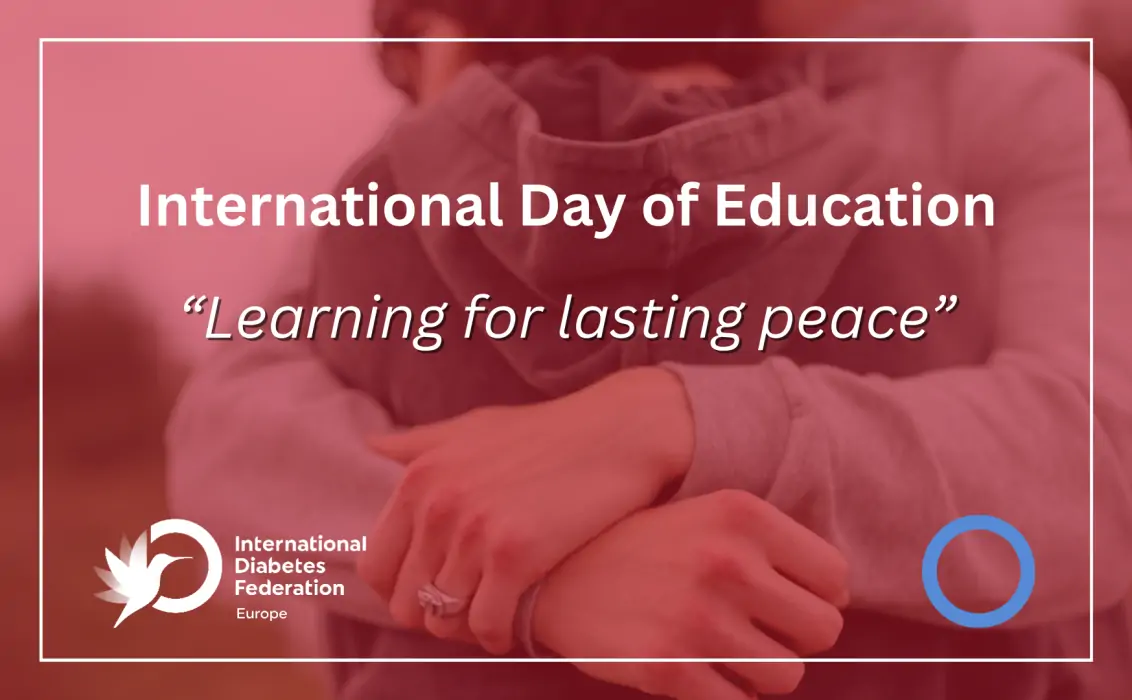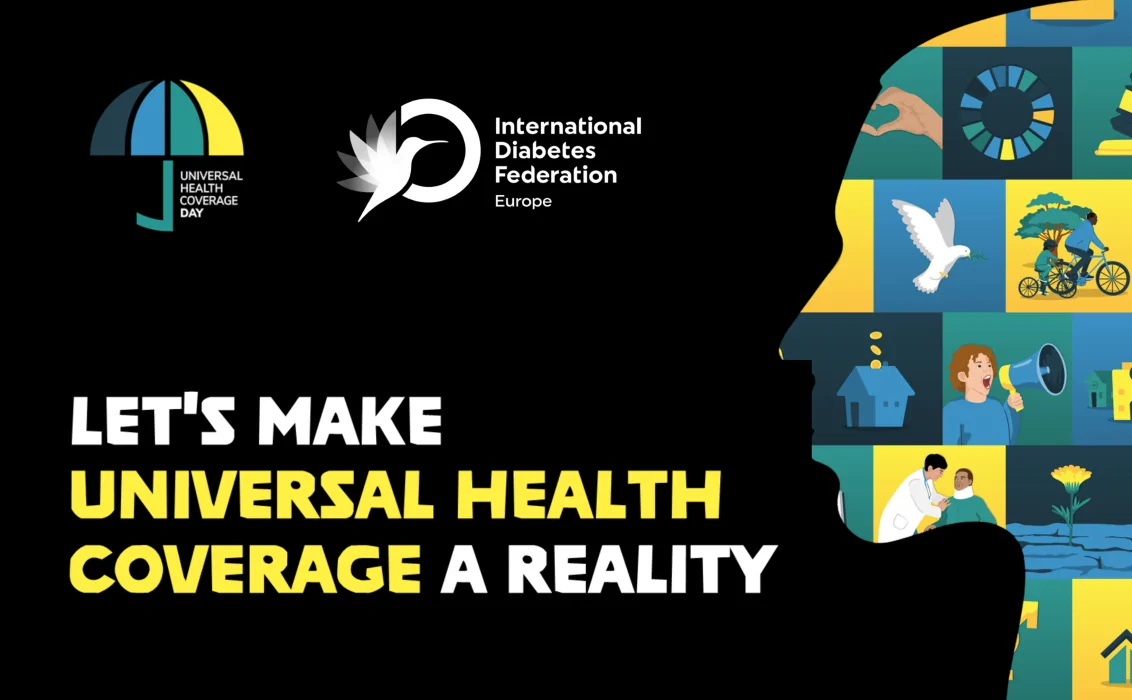Each year, on January 24, we celebrate the International Day of Education. This year, under the theme, “Learning for lasting peace”, the day aims to raise awareness of education as a powerful tool to counteract discrimination and hate speech and to empower people with the necessary knowledge, values, attitudes, skills and behaviours to become agents of peace in their communities.
Diabetes stigma and discrimination
Globally, we are witnessing a surge of conflicts along with hate speech, intolerance and discrimination that not only affect people on a personal level, but also undermine inclusion, diversity and human rights in our societies [I]. People living with diabetes (PwD) often experience this phenomenon when they encounter stigma and/or discrimination associated with their condition. Diabetes stigma refers to negative social judgements, stereotypes and prejudices about diabetes, or about a person or a group living with diabetes, while diabetes discrimination refers, at the individual level, to unfair or prejudicial treatment of a person due to their diabetes and, at the structural level, to societal or cultural norms and institutional or organisational practices that constrain a person’s right to social justice and fair and equitable treatment due to their diabetes [II].
According to a study from The Lancet, four in five adults living with diabetes experience diabetes stigma and one in five experience discrimination due to diabetes [II]. In 2023, Diabetes UK gathered the experiences of 450 PwD and found that 80% of them have encountered negative attitudes because of their diabetes [III]. Diabetes stigma and discrimination can be found across all walks of life and in various environments, from schools to one’s workplace, family and groups of friends, in sports and in the media, as well as in healthcare settings.
They are usually associated with misconceptions about the condition and a “blame and shame” culture for which diabetes is seen as one person’s fault and the direct consequence of unhealthy lifestyle choices such as being inactive or eating too much sugar. These misconceptions often result from a lack of knowledge and understanding of a condition as complex as diabetes and the lack of awareness of some of its key risk factors such as genetics and the social determinants of health.
The impact of diabetes stigma and discrimination
At a personal level, diabetes itself already places a huge burden on PwD as it requires them to self-manage the condition seven days a week, 24 hours a day. Experiencing diabetes stigma and discrimination can further exacerbate this burden. Diabetes stigma is associated with depressive and anxiety symptoms as well as reduced general emotional wellbeing which can lead to social withdrawal and isolation where PwD experience a lack of social support [II].
Not only does diabetes stigma take a toll on PwD’s emotional and mental health, but it can also influence their physical health outcomes. The sense of blame and shame and the fear of judgment can make diabetes management more difficult and prevent PwD from seeking the care they need to optimally manage their condition. According to research from Diabetes UK, 50% of PwD miss healthcare appointments at least sometimes due to stigma [III]. Additional studies have also established a correlation between diabetes stigma and low self-care, scarce adherence to treatment and lower quality of life among people living with diabetes [IV; V; VI]. This happens in particular when stigma is internalised and PwD prefer to hide their condition and self-management activities and avoid facing their healthcare professionals (HCPs).
At the structural level, diabetes stigma and misconceptions can lead to unfair treatment and discrimination in areas such as education and employment. PwD may fbe treated differently by teachers or fellow students; discrimination may limit their employment opportunities, or they may face more stringent regulation in everyday life such as when obtaining or renewing their driver’s license.
Evidence shows that diabetes stigmatisation and prejudices can also affect public support as well as funding for research in diabetes prevention, management and care [II]. Negative stereotypes and lack of awareness of the complexity of this condition can prevent the development and implementation of effective policies that address its multiple risk factors, including the social determinants of health.
The role of education
Education plays a crucial role in counteracting diabetes stigma and the impact it has on PwD and society by increasing understanding, reshaping language and fostering empathy.
Fighting misconceptions
Fighting misconceptions and prejudices associated with diabetes requires educating the general public about its complexity and risk factors to challenge the narrative that places the responsibility solely on the person living with the condition.
Diabetes education programmes in schools and communities as well as public awareness campaigns can be powerful tools to strengthen diabetes prevention, highlight the multifaceted nature of diabetes and improve the general understanding not only of its medical implications but also of the importance of supporting and showing empathy towards those living with the condition.
Language matters
Education also plays a crucial role in promoting inclusive language that moves away from simplistic and judgmental stereotypes. Adopting person-first and respectful language when talking with, or about, PwD is essential to reshape the way society looks and thinks of diabetes and foster an environment in which PwD feel supported.
Public officials, scholars, educators, healthcare and media professionals, and all those communicating about diabetes to the public should commit to following guidelines on respectful and non-stigmatising language.
Listening without judgement
The relationship between PwD and their HCPs can greatly influence health outcomes. Communication training should be incorporated in the curriculum for HCPs to equip them with the skills to adopt empathetic and stigma-free communication. They should be able to listen to PwD without judgement and provide the necessary support for coping with the distress that can be caused by stigma and discrimination. By adopting a person-centred approach, HCPs can help create a supportive environment that facilitates optimal diabetes management and ultimately improve PwD’s quality of life.
#NothingAboutUsWithoutUs
The lived experience of PwD, their preferences and needs should always be included in designing solutions to fight stigma and discrimination.
Initiatives that provide PwD with platforms to share their experience and expertise, such as the establishment of patient advisory boards within healthcare facilities, research projects and policy making bodies, should be leveraged to effectively engage PwD in monitoring and improving the delivery of healthcare services, research process and decision making. To this purpose, education on diabetes should not only be directed at the general public, but it should also be used as a tool to empower PwD to advocate for their needs.
Shaping a future free of stigma and discrimination
Over the past decades, we have witnessed great progress in the fight against diabetes stigma with initiatives led by the diabetes community such as the Language Matters movement and the recent Pledge to end diabetes stigma. Despite these strides, more structured and long-term action by governing bodies and healthcare systems is needed to reshape the narrative and reduce discrimination across all types of diabetes.
As we celebrate the International Day of Education, we are reminded of the key role that education plays in fostering peace. As such we want to raise awareness of the urgent need to prioritise education, regulate the use of inclusive language and strengthen collaboration with PwD to shape a fairer society that stands united against diabetes stigma and discrimination.



